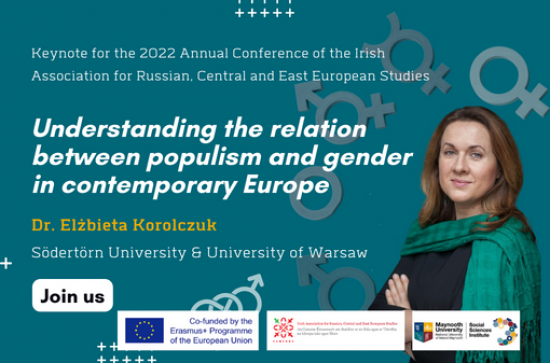
Keynote for the 2022 Annual Conference of the Irish Association for Russian, Central and East European Studies - Elżbieta Korolczuk, Södertörn University & University of Warsaw
Understanding the relation between populism and gender in contemporary Europe
In recent years patriarchal gender norms and ideologies have become an integral part of the right-wing populist parties programs. Right-wing leaders, including Jarosław Kaczyński, Victor Orban, Jair Bolsonaro and Matteo Salvini have invested in creating their image as defenders of traditional family and the nation against the excesses of what they call “gender ideology.” Such a stance have helped them to gain public support: a 2019 opinion poll showed that when asked about the biggest threats for Poland in the 21st century, the majority of young men and older people declared that their biggest fear is the threat of the “gender ideology and LGBT movement.”
The lecture will focus on the relationship between populism and gender. Rather than looking for specific gendered aspects of populism as an ideology, I will examine a growing opportunistic synergy between the right-wing parties and ultraconservative groups opposing “gender ideology.” This synergy plays out on two distinct levels: ideological/discursive and strategic/organizational. Since populism is not a robust ideological project, it readily feeds on ideas and narrative structures promoted by the anti-gender ultraconservative movement, albeit often in an opportunistic and selective fashion. Populists also cooperate closely with the anti-gender organizations as they need new cadres in the process of a sweeping elite change. Simultaneously, the actors behind anti-gender campaigns use the organizational resources that right-wing parties offer and access to political processes, especially in contexts such as Poland where the latter are in power. What facilitates this collusion is the fact that the ultraconservative critiques of “gender” have been framed in populist terms. The movement presents itself as a necessary and courageous defense of “the people” against powerful and foreign “liberal elites,” with “gender ideology” emphatically identified as a modern version of colonialism.
This lecture opens the 2022 annual conferences of IARCEES, asks what are the ideologies that support and strengthen the implementation of the illiberal democratic rule? Are these ideologies new or do they draw from a legacy of a particular period in the past? What world do these ideologies envision and what world do they condemn? And in what way are the illiberal democratic tendencies similar and different across the CEE region? We want to investigate the role of organisations, institutions and grass root movements assisting the illiberal populist governments in implementing these ideologies. Are they of local or global outreach? Whose interests do they serve? What new phenomena can be seen emerging that directly oppose or undermine the illiberal rule?
Responder: Dr Pauline Cullen (MU))
Chair: Dr Aneta Stępień (MU)
Elżbieta Korolczuk is an Associate professor in sociology, working at Södertörn University in Stockholm and at the American Studies Center, Warsaw University. Her research interests involve social movements, civil society and gender. She currently studies civil society elites in Europe in a program sponsored by Riksbankens Jubileumsfond, and analyzes anti-gender mobilizations and feminist responses to anti-gender and anti-democratic forces in Horizon Europe project (CCINDLE). Her most recent publications include a co-authored volume co-edited Women’s Rebellion. Black Protests and Women’s Strikes, published by European Solidarity Centre in 2019 (with Beata Kowalska, Jennifer Ramme and Claudia Snochowska-Gonzalez) and a monograph co-authored with Agnieszka Graff Anti-gender Politics in the Populist Moment (Routledge 2021). Korolczuk is also longtime women’s and human rights activist and a commentator.
For further information on the Full Conference see Eventbrite here
